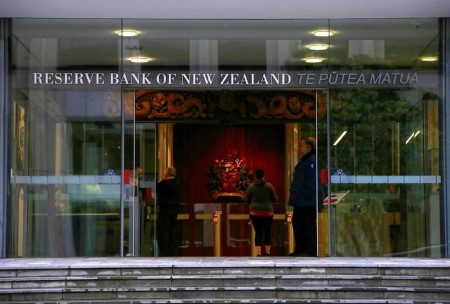- Global c.banking context plays a role in RBNZ decision-finmin
- Low inflation leaves room for political pressure on c.banks
- Adding employment to targets might increase easing bias
New Zealand's decision to change its central bank's inflation-targeting mandate, which has served as a model for the rest of the world, partly reflects a global shift on the role of monetary policy since the 2008-09 financial crisis, according to Finance Minister Grant Robertson.
With growth in consumer prices and wages stubbornly low, central banks are under increasing pressure globally to take on responsibilities beyond inflation targeting.
To that end, the new Labour-led coalition government plans to add employment to the Reserve Bank of New Zealand's mandate.
"Monetary policy and the work of central banks has come under huge pressure since the global financial crisis and the levers and tools" available to them "have proved challenged," Robertson told Reuters in an interview on Nov 10.
"What's happened globally has been one of the things that's driven that."
New Zealand is poised to become the third central bank member of the Bank for International Settlements (BIS) to change its official mandate after the crisis in relation to employment.
Argentina added a reference to employment among other adjustments in 2012 and Israel made employment a secondary goal while adding a mention of social inequality in 2010. The new mandate in New Zealand is expected to come into force in the first half of 2018.
In 1989, New Zealand's central bank was the first in the world to adopt a defined inflation target, a move that was soon followed by Canada, Britain and dozens of other developed and emerging economies.
Now, the trend seems to be towards broader goals amid growing public pressure.
"I think lots of people globally" are "asking about what central banks have been doing," the Reserve Bank of New Zealand's assistant governor, John McDermott, told Reuters. "That's a global zeitgeist."
In Iceland, a government committee is looking into whether the central bank should exert more control over a surging currency. In the United States, the Fed Up advocacy group that calls for loose monetary policy has gained access to global gatherings of central bankers. In more extreme cases, anti-austerity protesters have clashed with police outside the European Central Bank's headquarters.
INDEPENDENCE AT RISK? Having drawn fire from many politicians and economists for not foreseeing the financial crisis, central bankers around the world are being pressed to explain why they are fixated on inflation when critics say policies like low interest rates and money printing are fuelling inequality and creating asset bubbles.
In a speech last month, Ben Bernanke, the former U.S. Federal Reserve chief, warned against a growing current of thought that central bank independence should be sacrificed when more, rather than less, inflation was the aim.
The "political blowback" from the crisis raised the possibility that legislatures could impose changes on central banks and even restrict their independence, Bernanke said.
He said that independence was paramount for reasons including technical competence, institutional credibility and the need for long-term visions beyond electoral cycles.
"That is why some central banks are cautious about having employment or growth added to their mandate the concern is that things will go back to the old days," said Claudio Borio, Head of the Monetary and Economic Department at the BIS, referring to the soaring prices of the 1970s and 1980s.
UNEMPLOYMENT VS ASSET PRICES Adding an employment goal brings the RBNZ in line with the Fed, which also aims to achieve full employment in addition to targeting inflation. Of the 60 BIS members, New Zealand would be the tenth to have a reference to employment in its mandate.
Robertson said the RBNZ would continue to target inflation, and his move was meant as a signal that full employment should be a goal for the entire "economic architecture", while preserving the central bank's "operational independence."
Unemployment is at a nine-year low of 4.6 percent. Robertson said a broader mandate could mean looser monetary policy at times.
One former economist with RBNZ, who asked not to be named due to the political sensitivity of the subject, said the looser stance might exacerbate inequality, a major concern of voters if, for example, young workers find it hard to enter the red-hot housing market.
Since New Zealand introduced inflation targeting, consumer price inflation has stabilised, while asset prices have surged - the stock market has since risen by over 260 percent and house prices by over 300 percent, five times faster than wages.
"One of the common things we discussed internally was that we knew that house prices drive quite significantly the economic cycle," the former economist said. "Shouldn't you find a way to incorporate that driver into your monetary policy framework?"
<^^^^^^^^^^^^^^^^^^^^^^^^^^^^^^^^^^^^^^^^^^^^^^^^^^^^^^^^^^^ Wages vs asset prices since inflation targeting http://tmsnrt.rs/2zGBg9Q^^^^^^^^^^^^^^^^^^^^^^^^^^^^^^^^^^^^^^^^^^^^^^^^^^^^^^^^^^^>
- Forums
- NZX - General
- News: New Zealand says tweak to c.bank mandate fits within "global zeitgeist"
Global c.banking context plays a role in RBNZ decision-finmin...
-
- There are more pages in this discussion • 3 more messages in this thread...
You’re viewing a single post only. To view the entire thread just sign in or Join Now (FREE)






